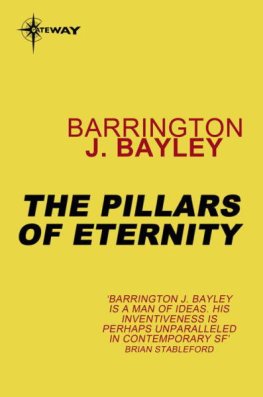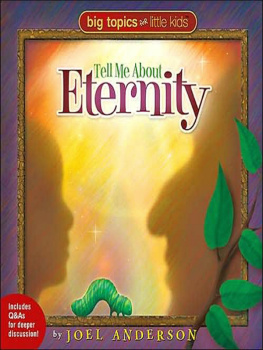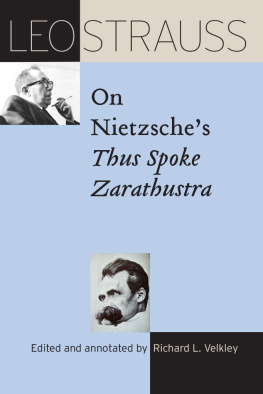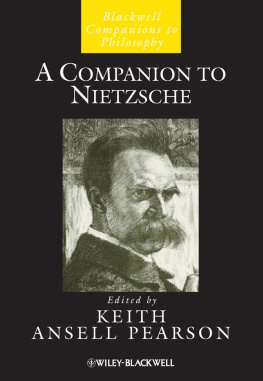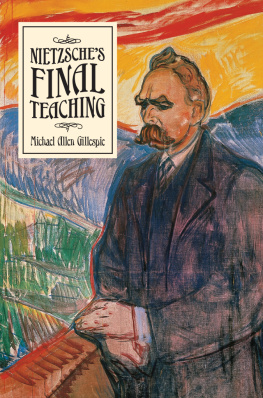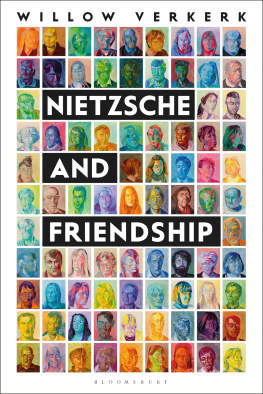The Flame of Eternity
The Flame of Eternity
An Interpretation of Nietzsches Thought
KRZYSZTOF MICHALSKI
TRANSLATED FROM THE POLISH BY BENJAMIN PALOFF
Princeton University Press
Princeton and Oxford
2007 Krzysztof Michalski
English translation copyright 2012 by Princeton University Press
Published by Princeton University Press, 41 William Street,
Princeton, New Jersey 08540
In the United Kingdom: Princeton University Press,
6 Oxford Street, Woodstock, Oxfordshire OX20 1TW
press.princeton.edu
All Rights Reserved
Library of Congress Cataloging-in-Publication Data
Michalski, Krzysztof, 1948
[Plomien wiecznosci. English]
The flame of eternity : an interpretation of Nietzsches thought / Krzysztof
Michalski; translated from the Polish by Benjamin Paloff.
p. cm.
Includes bibliographical references (p. ) and index.
ISBN 978-0-691-14346-0 (alk. paper)
1. Nietzsche, Friedrich Wilhelm, 1844-1900. 2. Eternal return. 3. Eternity. I. Title.
B3318.E88M5313 2012
193dc23 2011025268
British Library Cataloging-in-Publication Data is available
The translation of this publication has been subsidized by Instytut Ksikithe POLAND Translation Programme

This book has been composed in Adobe Caslon Pro
Printed on acid-free paper.
Printed in the United States of America
10 9 8 7 6 5 4 3 2 1
Contents
Preface
THE SUBJECT OF THIS book is eternity, the concept of eternity. The point of departure is Nietzsche. I contend that Nietzsches thought can be organized into a consistent whole through precisely his concept of eternity. Both original and at the same time deeply rooted in tradition, Nietzsches concept remains as thought-provoking for us as it had been among his contemporaries.
In Nietzsches books and notes, eternity emerges under the name the eternal return of the same. But we find the notion of eternity not only where we hear of eternal return: it is present in nearly everything Nietzsche wrote, from his first sketches to his last pages before he succumbed to madness. Nietzsches intellectual work is, from beginning to end, a reflection on human lifehow it passes, how it gives rise to new thingsand therefore on time. And time, Nietzsche believes, cannot be understood without eternity; without reference to eternity one cannot understand how it flows, what we mean when we say that it destroys or creates.
In my reading of Nietzsche eternity is a dimension of time, the core of time, its essence, its engine. Not its infinite continuation, not its refutation; eternity is neither a diamond nor the rock of which time does not partake. The concept of eternity answers the question of why today transforms into yesterday; eternity comes to the fore precisely in the flow of time.
Eternity, for Nietzsche, is thus a physiological notion; the concept that succinctly expresses the temporality of our lives is that of the body. If eternity comes to the fore in time, then it is precisely our bodily presence in the world, the body, that must be its expression.
The body: hair falls out, muscles get flabby, memory fades. But thats not all. The concept of the body, Nietzsche contends, points to something more than this falling out, this loss of tone, this fading. To something more than disintegration. The confrontation with death demonstrates this. As does love.
In the face of death, all known concepts, all words, lose their meaning, are no longer useful. What good, then, are such notions as more or less? Whats broken here? Death is not the next step in life; when I am dying, I am not more ill. Death is a step into the abyss, a radical interruption of continuity. Death does not fit what I know; our confrontation with death places us before a wall of incomprehension. Before a mystery.
Isnt it for precisely this reason that love is as strong as deathbecause, like death, love demolishes everything it had seemed we understood and interrupts the course of the life we have lived till now?
The body: our physical, fragile, inevitably mutable presence, inexorably slipping away, is also awhat? a sign? a symbol? a reaching-out?for a mystery that evades words and concepts, a mystery hidden in a loved ones smile, in the terror-inflected hope that confronts the inevitably approaching end of everything I see, feel, and think. Death and love reveal the fundamental discontinuity of our bodily presence in the world. The fact is that in every moment of our lives all meaning may become suspended, and (heres Nietzsche) the clock of my lifethe clock that measures the rhythm of events: yesterday a seminar, today shopping, tomorrow travel[draws] a breath. In this interval, briefer than any moment one can measure, in this crack, this fissure, this tearin the blink of an eyeeverything is left to question, and a chance for a new beginning arises. This is eternity. Because of it, the seemingly ever-present network of meaningsthe worldpasses, becomes, but is not.
Eternity is therefore a concept that characterizes our lives in their physical, material, corporeal realityday in, day out. It is a concept that refers to the impossibility of uniting any moment of life into one, contentfilled totality, into the totality of some content. Eternity is the internal diversification of our lives, the difference between what is or could be known and that more which escapes all knowledge.
Eternal life, Nietzsche notes, is no other life: its the very life you are living.
It may be that only in life so conceivedlife that cannot be consolidated into a totality, fractured life, marked with the irremediable fissure of eternityperhaps only in such a life one may find a place for God.
From the perspective of life as a sequence of interlinked momentsfrom birth to death, from breakfast to dinnerthis interval, this fracture, this momentary breathlessness is naturally a threat, a sickness, a pathology. Were sick with eternity: its chronic state is time, its crisislove and death. But, on the other hand, isnt it also pathological that we see sickness in the very thing that constitutes the meaning of life, that determines what it means to live? That we take the essential discontinuity of our livesthe fact that life passes away, becomes, flowsfor a sickness to be treated? That we try to fill this gap with concepts, to patch the fracture of every moment with some piece of knowledge, to remove that internal diversification of life with the help of some truth underlying it, and thus to render our lives consistent and comprehensible?
It is precisely this pathology that Nietzsche calls nihilism.
He recognizes it in many phenomena of modern culture: in history as science, in science in general. In morality, insofar as it attempts to construct a totalizing account of good and evil. In religion, particularly in Christianity, insofar as it takes God for truth, knowledge of which (if only at some other time, in some other world) allows one to resolve all (or at least the most important) problems and find unshakeable certainty. Can such nihilism be overcome?
Of course not. At least, not in the same way that my organism overcomes the flu or bronchitis. Isnt life of necessity an effort to connect today with yesterday and tomorrow, an effort to construct some continuity, to unite what is different? Can life therefore dispense with the instrument of this effortthe truthalong with its claims to universality? Nihilism is a disease whose symptom is man as he is: human life.
But at the same time, yes, nihilism can be overcome. Each moment of my life provides yet another chance to do just that; insofar as it conceals within itself the possibility of breaking free from the continuity of yesterday and tomorrow, the possibility of liberation, the chance at a new beginning. We see this in the confrontation with death, in love, in eternal love. But we cannot overcome nihilism in this way once and for all, not even for the moment: today in nihilism, tomorrow not. Life is a constant overcoming of nihilism, unwavering tension between the effort to establish continuity and the effort to break free from it.
Next page

